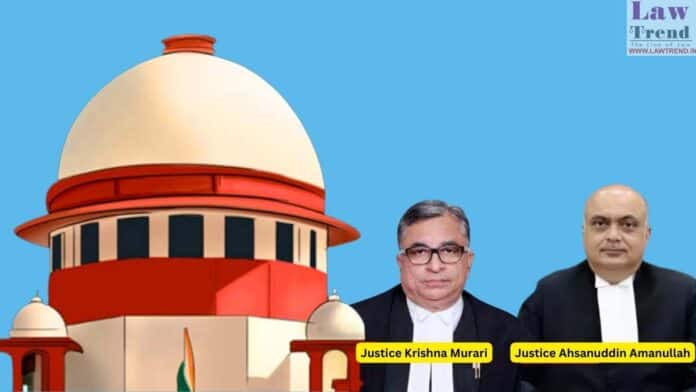The Supreme Court on Tuesday said it is essential for courts to be “extremely cautious” while passing adverse remarks against the parties involved and remarks passed in courts now have far reaching ramifications and can cause great injury to the reputation due to live broadcast of proceedings.
The apex court said the legal system in general and the judicial system in particular have ushered in a new age of accessibility and transparency due to the adoption of virtual hearings and live telecast of open court proceedings.
It said while this “never before seen transparency” in the judicial system brings with it great benefits, it also attaches with it a stricter standard of responsibility on judges while conducting such court proceedings.

A bench of justices Krishna Murari and A Amanullah made these observations in its judgement quashing an order passed in July last year by the Karnataka High Court which had passed some adverse remarks, including against a senior IPS officer, during hearing of a bail petition in a bribery case.
The bench noted the single judge of the high court had also issued a direction to the CBI, mandating the agency to probe the past records of one of the appellants.
“Remarks passed in court, due to the live broadcasting of court proceedings, now have ramifications that are far reaching, and as can be seen in the present case, can cause great injury to the reputation of the parties involved,” it said.
“In such a circumstance, it is essential for the courts to be extremely cautious while passing adverse remarks against the parties involved, and must do so with proper justification, in the right forum, and only if it is necessary to meet the ends of justice,” the bench said.
It said changes in the judiciary, which has ushered into a new age of accessibility and transparency due to the adoption of virtual hearings and live telecast of open court proceedings, have ensured that the courts as redressal mechanisms have become more accessible to the common man than ever before.
“The limitations of physical infrastructure, that has constrained the courts to a physical location, has often been cited as one of the main roadblocks in the path towards access to justice. This roadblock, however, has now been cleared due to the availability of technology and the adoption of the same,” the top court said.
While dealing with the issue of whether adverse remarks made by high court during the bail proceedings is liable to be expunged, the bench noted the high court had on two separate occasions in July last year made adverse remarks against the appellants, which is said to have caused great harm to their reputation, during the bail proceedings.
“Due to the proceedings being broadcasted on the high court’s YouTube channel, the said comments have received wide publicity, and several media and news outlets have picked up on those comments and reported the same,” it said.
The bench said that bail proceedings, unlike a full criminal trial, are burdened with the task of only forming a prima facie view on the merits of the case and in such a circumstance when the evidence is not fully analyzed and a presumption of innocence is still operational in favour of the accused, “the courts must then be extremely cautious in passing adverse remarks against the accused”.
“This becomes especially important in cases where the party against whom the remarks are passed do not have a lis in the said proceedings, for such comments, especially if passed by constitutional courts, can cause great injury to the reputation of the parties at the receiving end of such remarks. This burden of caution on the courts has been held in a catena of judgments by this court,” it said.
The bench said as far as the IPS officer is concerned, the remarks made by the high court against him seem to be unreasonable and without justification.
It said the IPS officer is merely a government employee of the department that is conducting investigation and has no personal involvement with the case.
The apex court further said no evidence against him was analyzed by the court and no opportunity was given to him to explain himself, however, “scathing and egregious remarks” were still passed against him.
Regarding another appellant, the bench said even though he is an accused in the alleged crime but was not a party to the bail proceedings before the high court.
The apex court said it is of the opinion that the actions of the high court during the bail proceedings of a third party are “manifestly arbitrary and unjust” and the high court must have confined itself to the issues relevant to it for the purposes of deciding the bail.
“A court of bail, especially in cases where the bail is sought for by a third party, is not a court that has all the relevant information to pass an order on the merits of an unconnected party, and such an order, if passed, has the potential to cause great harm to the said party without them being afforded an actual and meaningful opportunity to defend themselves,” the bench said, while expunging the adverse remarks and quashing the high court order.







